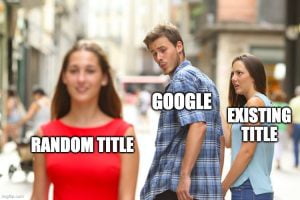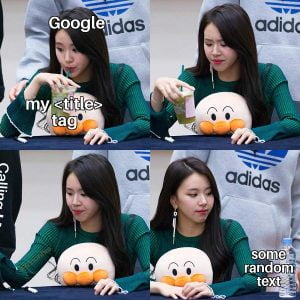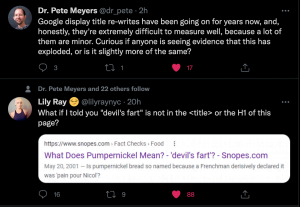 If you follow SEO News (which we understand if you don’t, that’s why you follow NEXTFLY for the latest SEO updates), the Twittersphere has been a buzz about Google Changing Article Titles on the SERP (search engine results page). Now, Google changes its algorithm all the time, why is this such a big deal now? Because they didn’t tell anyone they were doing it. Usually, Google is upfront about their changes and gives SEO experts time to adjust before implementing these changes. This time, nothing was announced before August 16th, 2021 when SEO experts all over the internet started noticing.
If you follow SEO News (which we understand if you don’t, that’s why you follow NEXTFLY for the latest SEO updates), the Twittersphere has been a buzz about Google Changing Article Titles on the SERP (search engine results page). Now, Google changes its algorithm all the time, why is this such a big deal now? Because they didn’t tell anyone they were doing it. Usually, Google is upfront about their changes and gives SEO experts time to adjust before implementing these changes. This time, nothing was announced before August 16th, 2021 when SEO experts all over the internet started noticing.
It’s important to know because it could change how visitors find your site. You might work hard on keyword research only to find that Google is changing what you wrote. This article will include some blogging and page writing tips that can help you too.
Where Google Pulls Its Information From
When you write a blog or a page, it’s a good idea to have a keyword that’s the center of your article. For example, if I run a Phoenix Bakery, and I want to write a blog about our new variety of cookies. The keywords that I’ll use throughout my post will be “Phoenix Cookies” in the text and headings. Now if a visitor is looking for cookies in Phoenix and searched “Best Cookies in Phoenix” my blog should show up. On the SERP you should see my blog title, website, and company’s name as written in the description.
What’s happening now, is that instead of showing the title that I wrote for my blog, Google Changing Article Titles in the SERP to better reflect what my reader is searching for. So when someone searches “Best Cookies in Phoenix” my blog might show up, but with a different title. What’s up with that?
Be Sure To Use Headings in Blogs
A lot of times, Google changes the title of your blog or pages in the SERP to one of your lower-level headings or a portion of your blog that answers the question the visitor asked.

For example, if someone searched “Where are the best cookies in Phoenix?” my blog might show up, but with a different title. It might change my title to “Best Cookies in Phoenix” because somewhere in my blog I wrote, “Try the best cookies in Phoenix at the Nextfly Bakery.”
Blogs and pages should have headings in them throughout the page. Not only does this make it easier for someone to read your blog by breaking it up, but it also gives Google direction about what your blog is about. Now, if Google is putting more value on your lower-level headings (H2, H3, H4, etc), you definitely want to make sure you’re including headings throughout your blogs. If you can’t stop Google from changing the title of your blog, at least give it some good options for titles by using headings that include your keywords.
Keywords are still important, obviously. The reason Google Changing Article Titles is to better answer visitors’ questions. It’s not a bad idea to include synonyms of your keywords in your headings. I might make one of my headings: “Try The Newest Cookies in Phoenix.” I didn’t use my keyphrase “Phoenix Cookies” and instead used “Cookies in Phoenix.” It’s a good way to cover all your bases no matter how Google displays your page in its results.
Why is Google Changing Article Titles?
It’s not just headings that are being picked to replace titles. Sometimes Google is inserting the date of the article before the title. Others have noticed Google Changing Article Titles in SERP from text from another page of the website. There’s no rhythm to where Google is picking their title text from.
Others have noticed that when titles were changed, they were often made shorter. Google may be doing this as an A/B test. Showing new titles to some users and not others to see which gets the most clicks. Title changes ultimately are meant to enhance the relevancy of the search results. Which should get your blog more clicks, hopefully.
Wasn’t Google Doing This Before?
 You may have noticed in some google searches if the keywords you search appeared in the description they were bolded. This is a “Search Result Enhancement” and can also include highlights or italics to grab the attention of the person searching. While this can help both the searcher to find what they are looking for, and gain the website more clicks, many SEO gurus have found that the highlighted keywords aren’t always included in the article that shows up in the search results. The link in the results page may instead take you to a different article, or to a specific spot further down the page.
You may have noticed in some google searches if the keywords you search appeared in the description they were bolded. This is a “Search Result Enhancement” and can also include highlights or italics to grab the attention of the person searching. While this can help both the searcher to find what they are looking for, and gain the website more clicks, many SEO gurus have found that the highlighted keywords aren’t always included in the article that shows up in the search results. The link in the results page may instead take you to a different article, or to a specific spot further down the page.
The moral of the story is that even if Google Changes Article Titles on your blogs and pages, as long as you’re following SEO best practices by using keywords and headings throughout your content, your pages and posts should still be easily found.
Contact NEXTFLY to Answer All Your SEO Questions
Headings? SERP? Keywords? What does this all mean? If we lost you, that’s ok, we’re here to help. Google Changing Article Titles is just one example of how Google can change its algorithm at a moment’s notice, so it’s important to stay on top of these updates. Contact NEXTFLY today to have an SEO consultation and see how we can improve your website’s performance.

